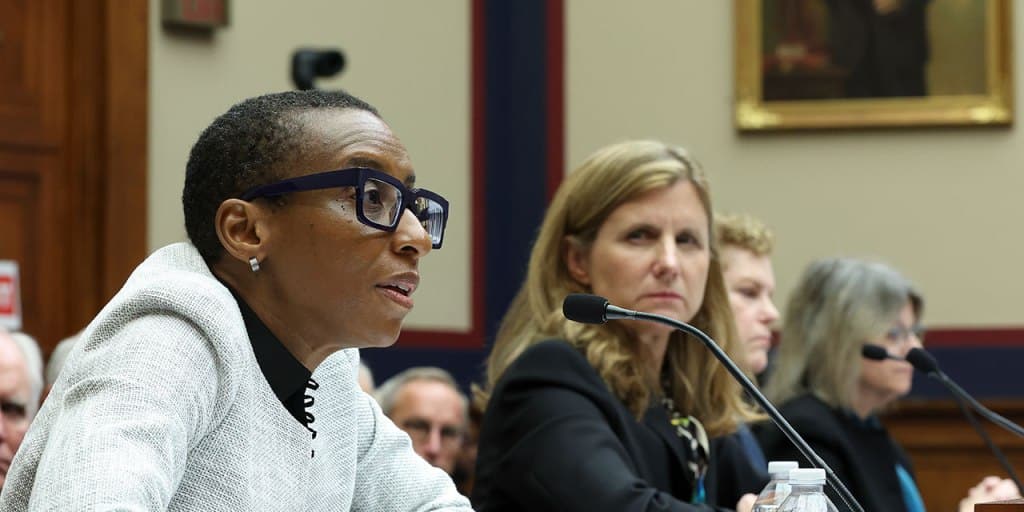
Last week, three of the most prestigious universities in the US faced a congressional hearing on their handling of antisemitism and other forms of hate on campus. The presidents of Harvard, MIT, and Penn had a chance to show their leadership skills and their commitment to fighting bigotry. Instead, they showed a lack of empathy, moral courage, and accountability.
The recent surge of antisemitic incidents on college campuses following the Israel-Hamas war in October triggered the hearing. The federal government has launched investigations into several universities, including Harvard and Penn, for possible violations of civil rights laws. The Education Department has also reminded schools of their legal obligation to prevent harassment that interferes with student learning.
The three presidents testified before the House Committee on Education and the Workforce, where they faced tough questions from lawmakers, especially Republicans. One of the most contentious moments came when Rep. Elise Stefanik, a New York Republican and Harvard alumna, asked them if calling for the genocide of Jews was protected by free speech on campus.
Their answers were shocking. Instead of denouncing such calls as hateful and unacceptable, they hedged and said it depended on the “context”. They seemed more concerned about the legal nuances than the moral implications. They failed to express any sympathy for the Jewish students who felt threatened and unsafe on campus.
Their responses sparked a public outcry, forcing them to backtrack and apologize. Penn’s president, Liz Magill, even resigned amid the backlash. But the damage was already done. They had lost the trust and respect of their students, faculty, staff, alums, and the wider society.
Americans Are Disappointed by Their Leaders
The fiasco at the hearing was not an isolated incident. It was a symptom of a broader crisis of leadership in our society. According to the latest U.S. News-Harris Poll survey, Americans are mainly disappointed by their leaders across various sectors and institutions. Nearly 9 in 10 Americans (86%) feel this way, and there is bipartisan agreement on this issue (83% of Democrats and 87% of Republicans).
About 60% of Americans think they are failing students, especially on issues of diversity, equity, and inclusion. Many Americans also believe that leaders today are hindering social progress (75%) and are unprepared to deal with the new challenges of our times (69%).
What do Americans want from their leaders? The research shows that the most essential quality for a successful modern leader is trustworthiness (88%). Americans also value honesty, hard work, empathy, and vision in their leaders.
These are the qualities that the college presidents failed to demonstrate at the hearing. They failed to be trustworthy, honest, empathetic, and visionary. They failed to lead by example and to inspire others.
Many of these presidents are new to their jobs and need time to learn and grow. But if they lose the trust of their key stakeholders, how can they lead? Many people think that academic leaders who did not condemn the brutal attacks on Israel on Oct. 7 and who have been vague on sensitive issues like campus speech that calls for genocide have no moral vision.
In these troubling times, we need strong and decisive leadership. We need empathy and support. We need to reject antisemitism, Islamophobia and other forms of hate. But we don’t need silence, moral ambiguity and word games.
And it’s not only the university presidents. These schools have respected boards of trustees who have to show leadership in their fiduciary role by selecting, supervising, and sometimes firing their presidents.
We are already feeling the harmful effects of having leaders who lack the qualities that Americans want. In the past two months, Congress has started investigations into the “learning environments” of many universities; state leaders are closely watching their public universities, trustees are under pressure, and donors are withdrawing their funds. Enough is enough!
Experience is not enough. Integrity and moral courage are more important than ever. Our academic institutions are too valuable to be run by leaders who don’t have these essential qualities.
College Presidents Can Restore Trust and Respect
Leadership in higher education is not easy. College presidents have to balance the needs and interests of various stakeholders, such as students, faculty, administrators, trustees, donors, and more. They also have to set a clear vision for their institutions and uphold their academic missions.
But these challenges are not excuses for poor leadership. They are opportunities for outstanding leadership. College presidents have a responsibility to foster a culture of respect, tolerance, and civility on campus. They have to protect the rights and safety of all members of their community. They have a role to play in shaping the future of our society.
Some college presidents have shown that they can rise to the occasion and lead with integrity and compassion. They have condemned antisemitism and other forms of hate on campus while also respecting free speech and academic freedom. They have supported their students and faculty, who have been targeted by bigotry and violence. They have taken action to prevent and address discrimination and harassment on campus.
These are the leaders that Americans need and deserve. These are the leaders that can restore trust and respect in higher education and beyond.

